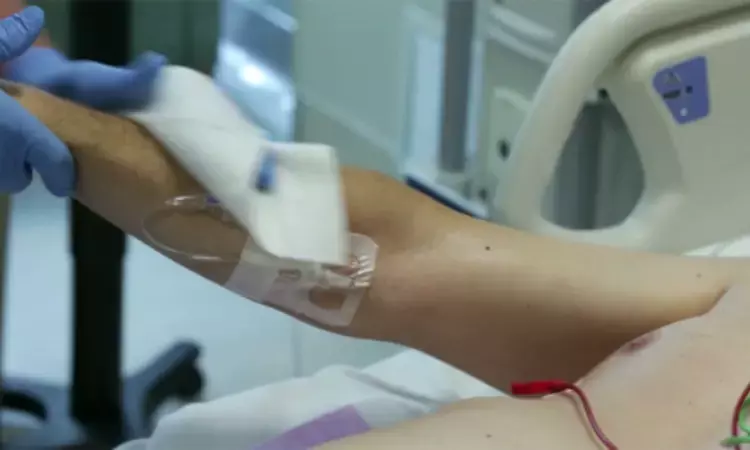- Home
- Medical news & Guidelines
- Anesthesiology
- Cardiology and CTVS
- Critical Care
- Dentistry
- Dermatology
- Diabetes and Endocrinology
- ENT
- Gastroenterology
- Medicine
- Nephrology
- Neurology
- Obstretics-Gynaecology
- Oncology
- Ophthalmology
- Orthopaedics
- Pediatrics-Neonatology
- Psychiatry
- Pulmonology
- Radiology
- Surgery
- Urology
- Laboratory Medicine
- Diet
- Nursing
- Paramedical
- Physiotherapy
- Health news
- Fact Check
- Bone Health Fact Check
- Brain Health Fact Check
- Cancer Related Fact Check
- Child Care Fact Check
- Dental and oral health fact check
- Diabetes and metabolic health fact check
- Diet and Nutrition Fact Check
- Eye and ENT Care Fact Check
- Fitness fact check
- Gut health fact check
- Heart health fact check
- Kidney health fact check
- Medical education fact check
- Men's health fact check
- Respiratory fact check
- Skin and hair care fact check
- Vaccine and Immunization fact check
- Women's health fact check
- AYUSH
- State News
- Andaman and Nicobar Islands
- Andhra Pradesh
- Arunachal Pradesh
- Assam
- Bihar
- Chandigarh
- Chattisgarh
- Dadra and Nagar Haveli
- Daman and Diu
- Delhi
- Goa
- Gujarat
- Haryana
- Himachal Pradesh
- Jammu & Kashmir
- Jharkhand
- Karnataka
- Kerala
- Ladakh
- Lakshadweep
- Madhya Pradesh
- Maharashtra
- Manipur
- Meghalaya
- Mizoram
- Nagaland
- Odisha
- Puducherry
- Punjab
- Rajasthan
- Sikkim
- Tamil Nadu
- Telangana
- Tripura
- Uttar Pradesh
- Uttrakhand
- West Bengal
- Medical Education
- Industry
Chlorhexidine bathing effectively wards off opportunistic infections in ICU patients: Study

Korea: Data from a real-world study showed that among patients in medical ICU (MICU) with a high vancomycin-resistant enterococci (VRE) endemicity, daily bathing with chlorhexidine gluconate (CHG) might be effective for reducing VRE cross-transmission. The study appears in the journal Antimicrobial Resistance & Infection Control.
In this era of antimicrobial resistance, patients in ICUs often acquire opportunistic infections or are colonized by vancomycin-resistant enterococc that limits the treatment options and leads to high fatality rates. However, the beneficial effects of universal CHG bathing on the control of VRE in clinical practice remains unclear. To clarify the same, Min Ja Kim, Korea University College of Medicine, Seoul, Republic of Korea, and colleagues aimed to investigate whether 2% CHG daily bathing reduced the acquisition of VRE in the setting of a medical ICU with VRE endemicity in a quasi-experimental intervention study.
The study was conducted in a tertiary care hospital in Korea from September 2016 to December 2017. The researchers compared the acquisition and incidence of VRE and the incidence of methicillin-resistant Staphylococcus aureus (MRSA) and carbapenem-resistant Acinetobacter baumannii (CRAB) between the pre-intervention and intervention periods with a 6-month CHG bathing intervention.
The primary and secondary outcomes were a change in the acquisition of VRE and incidence of VRE, MRSA, or CRAB between the two periods, respectively.
259 patients were enrolled in the pre-intervention and 242 in the intervention.
Study's key findings include:
- The overall CHG daily bathing compliance rate was 72.5%.
- In the ITS, there was a significant intervention effect with a 58% decrease in VRE acquisition following the intervention.
- There was no significant intervention effects on the incidence trend of VRE, MRSA, and CRAB determined by clinical culture between the pre-intervention and intervention periods.
"Our results showed that daily bathing with 2% CHG at a compliance rate of 72.5% could be an effective adjunctive control measure for reducing the acquisition rate of VRE in the ICU where VRE is endemic," the authors wrote.
Reference:
Suh, J.W., Kim, N.H., Lee, M.J. et al. Real-world experience of how chlorhexidine bathing affects the acquisition and incidence of vancomycin-resistant enterococci (VRE) in a medical intensive care unit with VRE endemicity: a prospective interrupted time-series study. Antimicrob Resist Infect Control 10, 160 (2021). https://doi.org/10.1186/s13756-021-01030-6
Dr Kamal Kant Kohli-MBBS, DTCD- a chest specialist with more than 30 years of practice and a flair for writing clinical articles, Dr Kamal Kant Kohli joined Medical Dialogues as a Chief Editor of Medical News. Besides writing articles, as an editor, he proofreads and verifies all the medical content published on Medical Dialogues including those coming from journals, studies,medical conferences,guidelines etc. Email: drkohli@medicaldialogues.in. Contact no. 011-43720751


